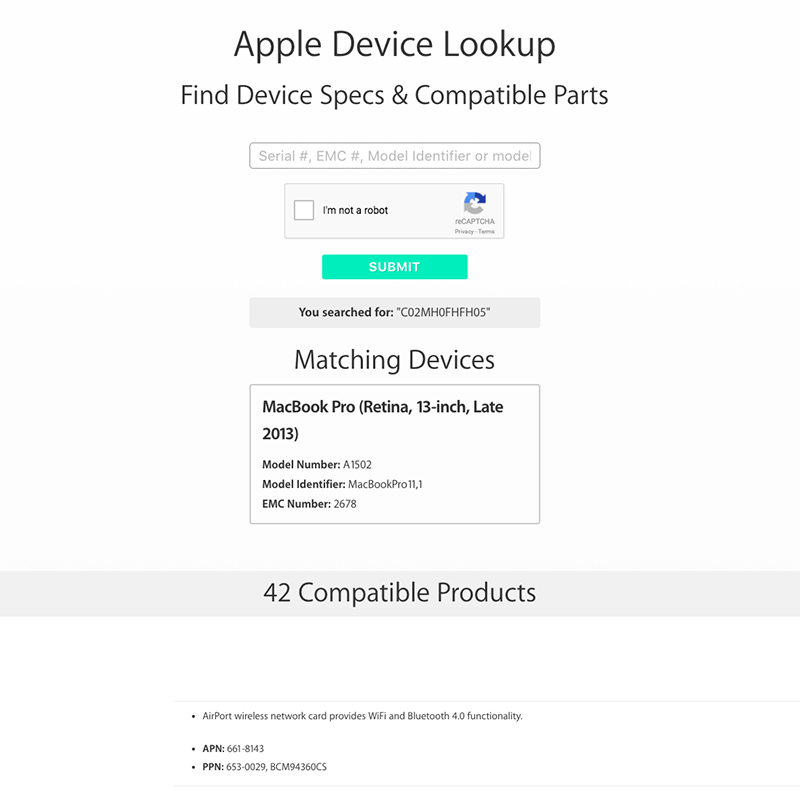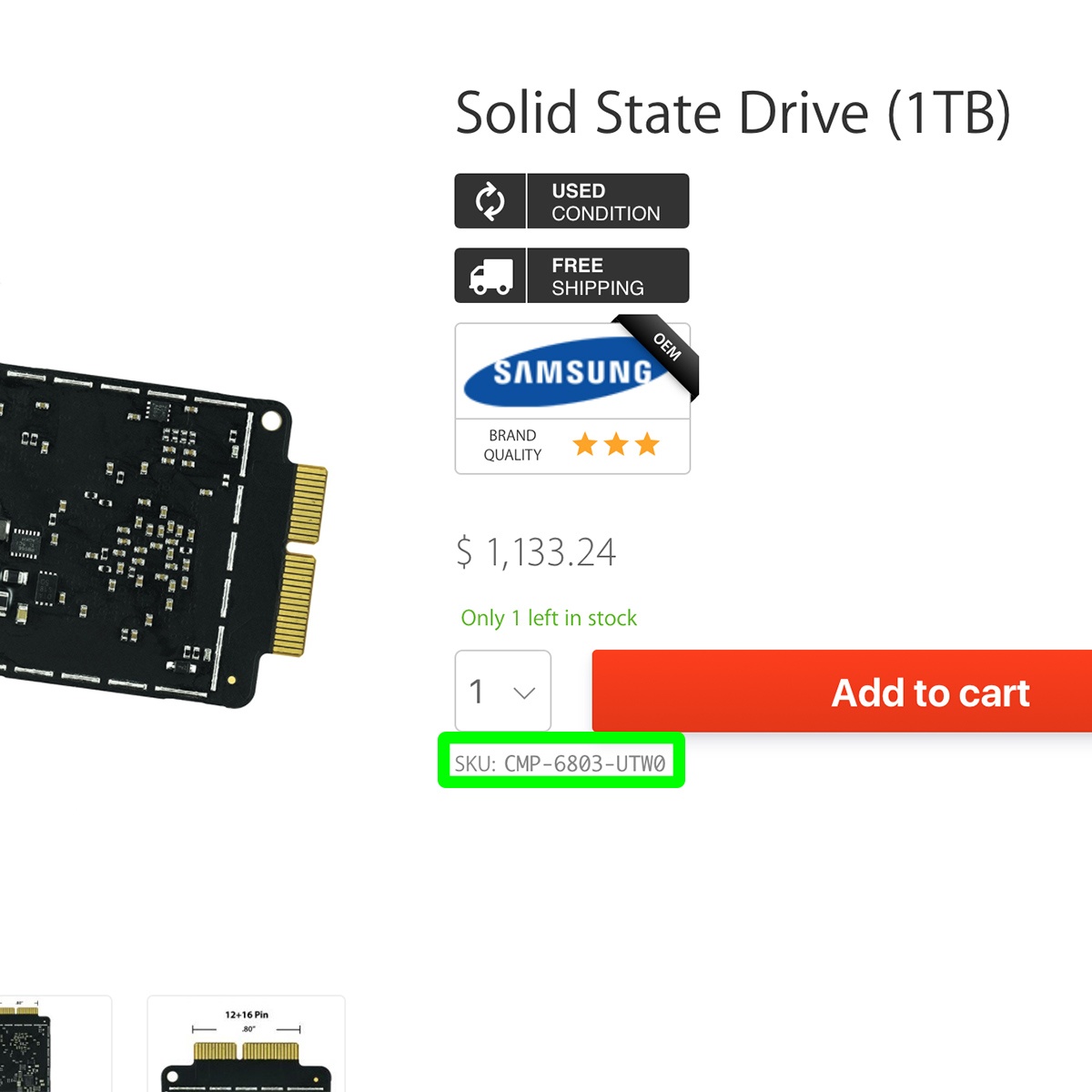Beetstech Site Updates for October
What’s New is our monthly update that highlights the recent site improvements we’ve been working on, so you can easily stay up to date.
This month is a whopper.
Apple Serial Number Lookup
Thousands of man hours and many millions of dollars later, we’ve done it. The master cryptanalysts at Beetstech cracked Apple’s Enigma code.
You can now give us a serial number… and we can tell you which Apple computer that serial number came from…
But really it’s more than that — it’s a full featured Apple device lookup which returns info about the device as well as all compatible parts, tools, and accessories. And it supports more than just serial numbers.
Supported Inputs:
- Serial number (e.g. C02MH0FHFH05)
- EMC Number (e.g. 2678)
- Model Identifier (e.g. MacBookPro11,1)
- Model Number (e.g. A1502)
Our own testing has shown it to be as accurate as Apple’s own (more tedious) serial number lookup, and it’s even been battle tested by our repair techs over the past few weeks. It might not find every Apple device ever made, but it’s getting pretty darn close. We’ll be adding more supported devices and making other improvements over the following weeks and months, so check back often.

Beetstech Prime Guaranteed 2-Day
Last month we began offering free shipping with no minimum order size for ProTech members, and now we’re unveiling our first premium shipping program, Beetstech 2-Day. Guaranteed delivery in two business days for a flat yearly (or quarterly) rate. We wanted to call it Beetstech Prime, but apparently some company already has that trademarked.
And we do mean guaranteed 2-day shipping. This isn’t Beetstech Probably 2-Day shipping. We’ll use a shipping service that will reach your location in two business days, every time.
If you’re already familiar with Amazon Prime, there won’t be too many surprises. Our 2-Day program will be priced at $119 for one year or $45 for three months, but we’re rolling it out with special intro pricing for a limited time.
Find out how Beetstech 2-Day can help your business and see if you qualify.
Request An Item We Don't Carry
We get a lot of requests about carrying new parts, tools and other items, so we’ve created a streamlined channel for you to tell us what you’d like to see. It’s like Gandhi once said:
“Request the change you wish to see in the world”
Product SKUs Are Searchable
You’ve probably seen our product SKUs many times before. They’re in your order confirmation email, on the packing slip when you receive a package and printed on our world class product labels.
So if you thought it didn’t make much sense that you couldn’t actually search the SKUs, then we totally agree. Now you can type a SKU into the search bar (accessible at any time by pressing CMD+B or CTRL+B) and it’ll pull up the matching product.
And the SKU is now visible on the product page itself. That’s nice too.

Questions or Comments?
We love to hear your thoughts, so let us know what you think in the comments.
Show Your Love For This Post
Recommended Posts
High Sierra and Testing RAM
With macOS 10.13, otherwise known as High Sierra, Apple introduced an ambitious EFI update. Several of the changes include: the introduction of the Apple File System, support for NVMe drives, and the usual batch of security updates. However, these EFI updates can cause some unwanted behavior when you test your Apple computer’s memory. At Beetstech, we use a long-time industry standard, MemTest86 to perform a comprehensive test of each computer’s RAM.
But never the type to blindly accept test results, strange testing outcomes led us to discover a bug in MemTest86 affecting computers running the new EFI firmware. In short, the newly updated EFI causes MemTest86 to incorrectly fail certain tests. But there is good news: while normal operation of MemTest86 is limited under these new EFI updates, we also discovered some simple workarounds for testing your Apple’s memory in MemTest86.
So let’s dive into how we discovered the MemTest bug, devised a reliable work-around, and get into some nitty gritty details of MemTest86 operation.
MacBook Air Power-On Pads – Location & Use
They go by “jumper pads”, “short-circuit pads”, “power pads”, and “power-on pads”. Whatever you call them, there are two bits of metal on your MacBook logic board that can force your laptop to boot up, even if the power button won’t do the trick.
OEM MagSafe Chargers vs Cheap Imposters: Teardown for Truth
Anywhere premium products are produced, there are unsavory folks trying to make a quick buck selling cheap knockoffs. It happens in every industry, from clothes to food to tech. But in recent years, counterfeit electronics have surpassed nearly all other categories of counterfeit goods by dollar value, and Apple, being the de facto high-end electronics manufacturer, makes for a prime target.
But you’d never be caught buying counterfeit electronics, because you can tell the difference, can’t you?
The Ultimate Guide to Apple’s Proprietary SSDs
Remember the good ol’ days of carrying a spare battery, upgrading your own RAM, maybe even adding a second hard drive? If you’re an Apple user, those luxuries may be behind us, but upgrading your own solid state drive is still a privilege the Apple overlords allow us to have, for now that is.
Despite retaining the ability to upgrade your own SSD, ever since Apple introduced their proprietary “blade” SSDs in 2010, the task hasn’t been as simple as it once was. Apple talks up read and write speeds, but they rarely dive into the nitty gritty details of the technology behind the SSDs they use — drives specially designed only for Apple computers.
After countless questions, both from customers and our own staff, we decided to start our own investigation into the hardware involved. You have to be a bit of a private eye to uncover the secrets behind these drives, and the deeper we looked, the more surprises we found.
Your Hard Drive Cable Is A Ticking Time Bomb
Owners of a Unibody MacBook Pro laptop are probably already aware that failure of the hard drive flex cable is a common issue. While it affects just about the entire Unibody lineup, the Mid 2012 MacBook Pro 13″ (Model A1278) is especially prone to this type of failure.
What is it that makes the Mid 2012 release special in this regard? A design flaw in the flex cable that seems to be compounded by the properties of the aluminum housing.
Our repair services department noticed this issue when they’d replace a bad cable, only to have the customer return a few months later with another bad cable. And possibly again with yet another bad cable. It didn’t matter if we used a used cable or a new cable in the replacement. Customers kept returning with the same persistent issue. We had to figure out what was causing the issue and find a solution.

Leave a Reply